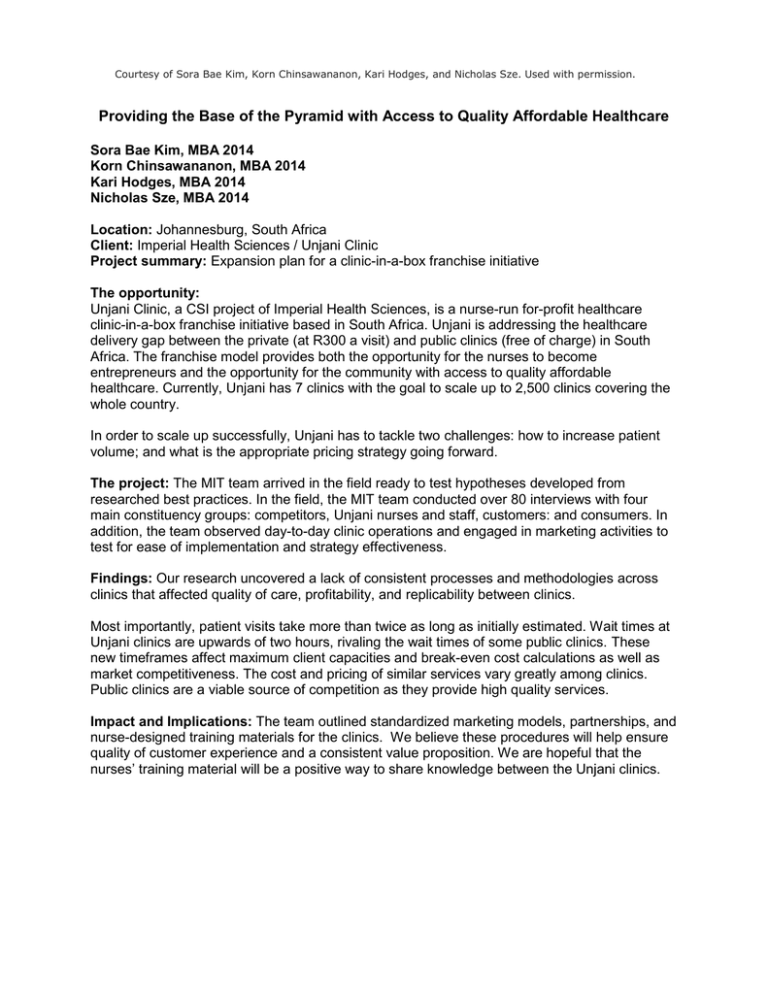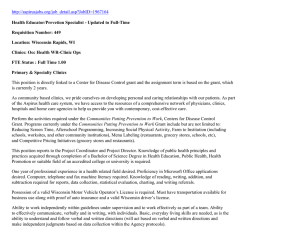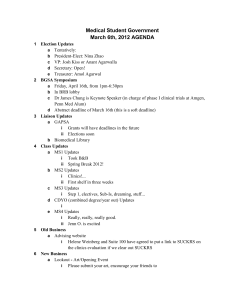Providing the Base of the Pyramid with Access to Quality...
advertisement

Courtesy of Sora Bae Kim, Korn Chinsawananon, Kari Hodges, and Nicholas Sze. Used with permission. Providing the Base of the Pyramid with Access to Quality Affordable Healthcare Sora Bae Kim, MBA 2014 Korn Chinsawananon, MBA 2014 Kari Hodges, MBA 2014 Nicholas Sze, MBA 2014 Location: Johannesburg, South Africa Client: Imperial Health Sciences / Unjani Clinic Project summary: Expansion plan for a clinic-in-a-box franchise initiative The opportunity: Unjani Clinic, a CSI project of Imperial Health Sciences, is a nurse-run for-profit healthcare clinic-in-a-box franchise initiative based in South Africa. Unjani is addressing the healthcare delivery gap between the private (at R300 a visit) and public clinics (free of charge) in South Africa. The franchise model provides both the opportunity for the nurses to become entrepreneurs and the opportunity for the community with access to quality affordable healthcare. Currently, Unjani has 7 clinics with the goal to scale up to 2,500 clinics covering the whole country. In order to scale up successfully, Unjani has to tackle two challenges: how to increase patient volume; and what is the appropriate pricing strategy going forward. The project: The MIT team arrived in the field ready to test hypotheses developed from researched best practices. In the field, the MIT team conducted over 80 interviews with four main constituency groups: competitors, Unjani nurses and staff, customers: and consumers. In addition, the team observed day-to-day clinic operations and engaged in marketing activities to test for ease of implementation and strategy effectiveness. Findings: Our research uncovered a lack of consistent processes and methodologies across clinics that affected quality of care, profitability, and replicability between clinics. Most importantly, patient visits take more than twice as long as initially estimated. Wait times at Unjani clinics are upwards of two hours, rivaling the wait times of some public clinics. These new timeframes affect maximum client capacities and break-even cost calculations as well as market competitiveness. The cost and pricing of similar services vary greatly among clinics. Public clinics are a viable source of competition as they provide high quality services. Impact and Implications: The team outlined standardized marketing models, partnerships, and nurse-designed training materials for the clinics. We believe these procedures will help ensure quality of customer experience and a consistent value proposition. We are hopeful that the nurses’ training material will be a positive way to share knowledge between the Unjani clinics. MIT OpenCourseWare http://ocw.mit.edu 15.S07 GlobalHealth Lab Spring 2013 For information about citing these materials or our Terms of Use, visit: http://ocw.mit.edu/terms.


